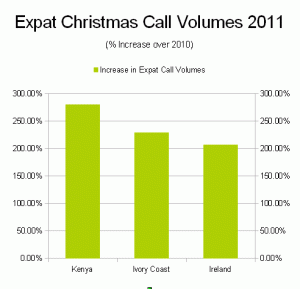
‘Tis not only the season to be jolly, but also to phone home–particularly for African expats.
VIP Communications, a provider of international calling services, recently released its 2011 Holiday Calling Report, a look at the seasonal calling habits of over 40,000 expat customers from 100 countries. It measured both average daily call volume and average time spent on the phone. In addition to Christmas the report included data for Valentine’s Day, Father’s Day and Mother’s Day.
VIP found African expats phone home most during Christmas. Of the top 10 countries receiving expat calls on Christmas, New Year’s Day and Valentine’s Day, 5 were in Africa. Kenya showed the largest increase in call volumes in 2011: 280.9%. The Ivory Coast came in second with a 229.8% increase and Ireland third with a 207.5% rise.
On the other end of the spectrum, VIP found Swedes to be “Calling Grinches.” Holiday call volumes from Swedish expats fell 64% in 2011.
Frankly we were a bit surprised to see so many African countries featuring so prominently in the report. Generally when we think “expat” Kenya and the Ivory Coast don’t leap readily to mind.
We suspect VIP’s results are partly tied to larger trends in expat calling–namely a preference for cheap voice over internet services like Skype among American and European expats. According to HSBC’s 2011 Expat Explorer Survey, 36% of expats use a video calling services such as Skype at least twice a week. By contrast, only 16% use a mobile phone and just 14% a landline.
HSBC concluded wealthier expats make more international phone calls. But we wonder whether that holds true on both ends of the spectrum–whether expats from both wealthier and poorer countries make more international calls than those with middling incomes. After all, mobile telephony is fast on the rise in Africa, it stands to reason international calling numbers would increase with it.
What the report makes abundantly clear is the average expat has little interest in making international phone calls when cheaper and more robust alternatives are available, either in the form of Skype calls (which allow video chat) or social media. Hence, telcos and international calling services are going to have to narrow their focus either in terms of income level or nationality to tap the market’s potential.
In our view, Africa’s probably a good place to start.